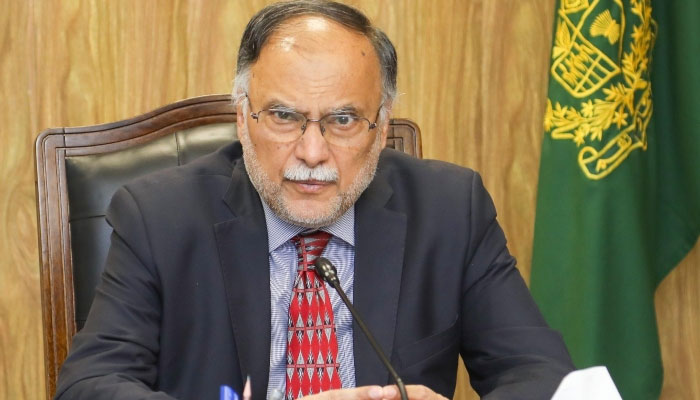‘Smog threatens both health and economy’
Islamabad: Planning and development minister Ahsan Iqbal on Tuesday voiced a serious concern about the causes and escalating effects of smog in the country, especially in the Punjab province, attributing it to human activities and calling for immediate action.
"Without a change in public behaviour, smog and air pollution will continue to pose a serious threat to people's health as well as the economy, especially the country's growth rate," the minister said during a meeting on the growing smog and air pollution in Islamabad and Rawalpindi.
Representatives of the World Bank, Punjab planning and development department, National Disaster Risk Management Fund, the climate change ministry, IFAD, planning commission, civil society, NDMA, and environmental protection agencies from all provinces and centre attended the meeting.
The federal minister emphasised the need for a unified national approach to combat the environmental challenge and noted that environmental protection was a key component of the government’s Five-E framework, which entailed various measures to address these issues.
He pointed out that while there was no shortage of knowledge, the real problem lied in the lack of its application. "All relevant institutions must take joint actions to tackle this problem effectively," he said.
The minister identified cross-border pollution, vehicle emissions, crop burning, and urban development as primary causes of smog and said the negative effects of the issue on people's health and daily life underlined the need for a public awareness campaign so that everyone became mindful of their environment and personal practices. He underscored the importance of a coordinated strategy among federal and provincial institutions, academia, and other stakeholders.
"There is an urgent need for developing a comprehensive plan of action to fight smog with an emphasis on ensuring effective implementation," he said. Mr Ahsan Iqbal also said that even pristine areas like Gilgit-Baltistan were being affected by air pollution, warning that the consequences would be severe if environmental pollution was not controlled. He said that failure to immediately act against pollution would lead to serious outcomes in the future.
The minister called upon all institutions to collaborate in addressing the issue and promote people's environmental awareness, saying collective efforts are essential to build a healthy and clean future.
-
 Jessica Alba, Cash Warren Finalize Divorce After 16 Years Of Marriage
Jessica Alba, Cash Warren Finalize Divorce After 16 Years Of Marriage -
 China’s AI Boom Takes Center Stage At Spring Festival One Year After DeepSeek Stirred The Industry
China’s AI Boom Takes Center Stage At Spring Festival One Year After DeepSeek Stirred The Industry -
 James Van Der Beek Called His Sixth Child Jeremiah 'healing For Us' Before His Death
James Van Der Beek Called His Sixth Child Jeremiah 'healing For Us' Before His Death -
 Elon Musk Vs Reid Hoffman: Epstein Files Fuel Public Spat Between Tech Billionaires
Elon Musk Vs Reid Hoffman: Epstein Files Fuel Public Spat Between Tech Billionaires -
 Gordon Ramsay Denies Victoria Beckham Got Handsy With Brooklyn At His Wedding
Gordon Ramsay Denies Victoria Beckham Got Handsy With Brooklyn At His Wedding -
 Gordon Ramsay Makes Unexpected Plea To Brooklyn As He Addresses Beckham Family Feud
Gordon Ramsay Makes Unexpected Plea To Brooklyn As He Addresses Beckham Family Feud -
 Prince Harry Warns Meghan Markle To 'step Back'
Prince Harry Warns Meghan Markle To 'step Back' -
 Selena Gomez Explains Why She Thought Lupus Was 'life-or-death'
Selena Gomez Explains Why She Thought Lupus Was 'life-or-death' -
 New Zealand Flood Crisis: State Of Emergency Declared As North Island Braces For More Storms
New Zealand Flood Crisis: State Of Emergency Declared As North Island Braces For More Storms -
 Nancy Guthrie Case: Mystery Deepens As Unknown DNA Found At Property
Nancy Guthrie Case: Mystery Deepens As Unknown DNA Found At Property -
 James Van Der Beek's Brother Breaks Silence On Actor's Tragic Death
James Van Der Beek's Brother Breaks Silence On Actor's Tragic Death -
 Megan Thee Stallion On New Romance With Klay Thompson: 'I'm Comfy'
Megan Thee Stallion On New Romance With Klay Thompson: 'I'm Comfy' -
 Nicole Kidman Celebrates Galentine’s Day Months After Keith Urban Split
Nicole Kidman Celebrates Galentine’s Day Months After Keith Urban Split -
 Justin Bieber Unveils Hailey Bieber As First Face Of SKYLRK In Intimate Campaign Debut
Justin Bieber Unveils Hailey Bieber As First Face Of SKYLRK In Intimate Campaign Debut -
 Caitlin O’Connor Says Fiance Joe Manganiello Has Changed Valentine’s Day For Her
Caitlin O’Connor Says Fiance Joe Manganiello Has Changed Valentine’s Day For Her -
 Rachel Zoe Sends Out Message For Womne With Her Post-divorce Diamond Ring
Rachel Zoe Sends Out Message For Womne With Her Post-divorce Diamond Ring




